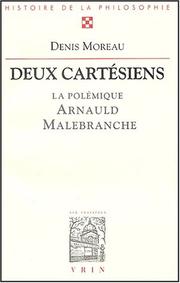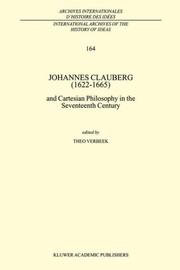| Listing 1 - 2 of 2 |
Sort by
|

ISBN: 2711613771 9782711613779 Year: 1999 Publisher: Paris: Vrin,
Abstract | Keywords | Export | Availability | Bookmark
 Loading...
Loading...Choose an application
- Reference Manager
- EndNote
- RefWorks (Direct export to RefWorks)
De 1683 à 1694, Antoine Arnauld et Nicolas Malebranche, anciens " amis " et prêtres que leur intérêt pour Descartes, leur révérence pour Augustin et leur commune inquiétude face au " libertinage " semblaient pourtant destiner à s'entendre, polémiquèrent violemment. En insistant sur l'aspect philosophique de ces débats, cet ouvrage propose la première interprétation d'ensemble de cette célèbre confrontation. Y a-t-il de sérieuses raisons philosophiques au désaccord entre Arnauld et Malebranche ? Leur détermination permet-elle d'éclairer certains aspects du malebranchisme ? Existe-t-il une philosophie d'Antoine Arnauld et peut-on en préciser les contenus ? Répondre à ces trois questions amène à éclaircir trois champs de recherche. En premier lieu, la polémique entre Arnauld et Malebranche fut un événement intellectuel. Nombreux furent les grands esprits contemporains qui prirent position et se trouvèrent ainsi impliqués, à des degrés divers, dans l'empoignade. En signalant leurs réactions, on voit apparaître les contours des camps philosophiques des années 1680, ainsi que quelques-unes des lignes de fracture conceptuelles qui contribuèrent à cette " crise de la conscience européenne " dont parlait Paul Hazard. En second lieu, les références à Descartes sont fréquentes chez Malebranche, incessantes chez Arnauld : en interrogeant le statut et les modalités de ces renvois et rapports croisés à une grande figure absente qui hante le débat, on précise le statut de la catégorie " cartésianisme " en histoire des idées. Enfin, Malebranche et Arnauld parlent souvent de Dieu. Au point de fuite de ce travail, on est alors conduit à une nouvelle interrogation : l'impuissance théologique du cartésianisme est-elle congénitale, ou bien peut-on tirer des dividendes théologiques de la philosophie cartésienne sans en faire jouer les structures et en modifier les concepts fondamentaux ?
Philosophy, French --- Philosophie française --- Arnauld, Antoine, --- Malebranche, Nicolas, --- -French philosophy --- Arnauld, Antoine --- Malebranche, Nicolas --- Philosophy. --- FILOSOFIA MODERNA --- Cartesianisme. --- Cartésianisme. --- Malebranche, Nicolas de, --- Et Malebranche. --- Et Dieu. --- Et Arnauld. --- Et Descartes. --- Et la théorie de la connaissance. --- -Arnauld, Antoine --- Philosophers --- Philosophie française --- Arnaud, Antoine, --- Arnaldus, Antonius, --- A. A. D. S. --- S., A. A. D. --- Arnauld, A. --- Arno, A., --- Arnauld, --- Arnauld, Antonio, --- Arnauld the Great --- Le Grand Arnauld --- Philosophy, French - 17th century --- Philosophers - France - 17th century --- Arnauld, Antoine, - 1612-1694 --- Malebranche, Nicolas, - 1638-1715

ISBN: 0792358317 9048152690 9401592373 9780792358312 Year: 1999 Volume: 164 Publisher: Dordrecht: Kluwer,
Abstract | Keywords | Export | Availability | Bookmark
 Loading...
Loading...Choose an application
- Reference Manager
- EndNote
- RefWorks (Direct export to RefWorks)
In this book twelve outstanding historians of early modern philosophy undertake a study of the philosophy of Johannes Clauberg (1622-1665). Clauberg was not only among the first followers of Descartes (whose philosophy he taught from 1650 in Herborn and from 1652 until the end of his life in Duisburg) but also assured its survival as an academic philosophy by giving it a more traditional and more didactic expression. A first group of articles deals with Clauberg's early metaphysics as it found its expression in his Ontosophia of 1646 (republished with very considerable changes in 1664), the way it was influenced by Comenius (Leinsle), its relation to Malebranche (Bardout) and Wolff (École) and the way in which it illustrates the difficulties of a Cartesian ontology in general (Carraud). A second group of articles deals with problems of knowledge: knowledge of God (Goudriaan), perceptual knowledge (Spruit) and causality (Pätzold). There are also articles on Clauberg's curious attempt to deal philosophically with the etymology of the German language (Weber), Clauberg as a teacher of Descartes' Principia (Verbeek), Clauberg's conception of corporeal substance (Mercer), and Clauberg's relation to later, more radical developments in Cartesian philosophy, especially in Lodewijk Meyer (Albrecht). The volume is completed by a biographical introduction and a short title bibliography of Clauberg's works, which allows an appreciation of Clauberg's lasting international influence. It is the first study on this scale of one of the most influential philosophers of the seventeenth century.
Clauberg, Johann, --- Descartes, René, --- Descartes, René --- Claubergius, Joh. --- Claubergius, Johannes, --- Clauberg, Johannes, --- Descartes, Renatus --- Cartesius, Renatus --- Clauberg, Johannes --- Influence --- Philosophy [Modern ] --- 17th century --- Philosophy. --- Religion. --- History. --- Philosophy, general. --- Religious Studies, general. --- History, general. --- Annals --- Auxiliary sciences of history --- Religion, Primitive --- Atheism --- Irreligion --- Religions --- Theology --- Mental philosophy --- Humanities --- Cartésianisme --- Cartésianisme --- Clauberg, Johann, - 1622-1665 - Congresses --- Descartes, René, - 1596-1650 - Congresses --- Clauberg, Johann, - 1622-1665 --- Descartes, René, - 1596-1650 --- Clauberg (johanes), 1622-1665
| Listing 1 - 2 of 2 |
Sort by
|

 Search
Search Feedback
Feedback About UniCat
About UniCat  Help
Help News
News